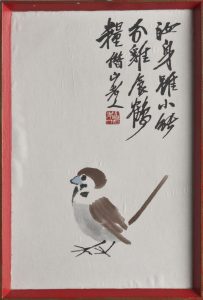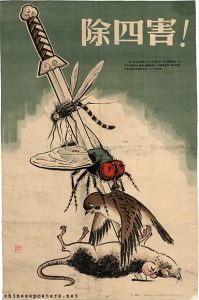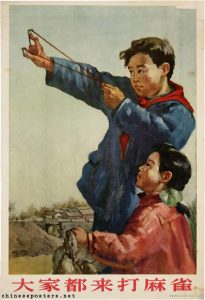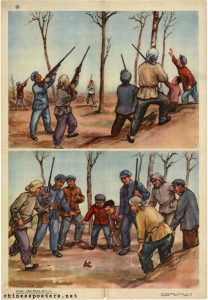Posts Tagged ‘Chinese history’
A tale of a sparrow
 In the late 1950s, when my husband Tony was a student, he strolled into a junk shop in the small town of Hawera, New Zealand. A charming image of a sparrow caught his eye. Fast forward ten years. Tony was by then an engineer at a high tech company in Silicon Valley. The sparrow pops up again in a letter I write to parents:
In the late 1950s, when my husband Tony was a student, he strolled into a junk shop in the small town of Hawera, New Zealand. A charming image of a sparrow caught his eye. Fast forward ten years. Tony was by then an engineer at a high tech company in Silicon Valley. The sparrow pops up again in a letter I write to parents:
14 April 1969
A friend of Tony’s from Memorex came to dinner. A Korean boy … He is really charming, and we had a pleasant evening. One interesting thing that came out of it – Yun also reads and writes Mandarin Chinese, so was able to translate the inscription on our sparrow picture for us. Do you remember our sparrow? It is a little brush drawing that Tony picked up in a junk shop in Hawera when he was a student, shortly before reading in a magazine a story about a famous Chinese artist who was objecting to a government campaign to kill off the sparrows to improve the wheat production. He made these little posters, inscribed with sentimental stories about the sparrow. And this, as far as we can tell, is what we have got.
With the help of the Internet, I’ve been piecing together my fragments of knowledge about this period in Chinese history. What I discovered is a familiar story about well-intentioned interference with nature leading to ecological disaster.
In the First Five-Year Plan of the newly-founded People’s Republic of China, families were each given their own plot of land. In the Second Five Year Plan, begun in 1958, a new agriculture system was announced. Family farms were grouped into collective farms, making each village a single production entity in which everyone would have an equal share. Food would be provided in a communal kitchen.
In theory, a collective farm where resources were centrally controlled should be more efficient and yield higher productivity. In practice, agricultural production figures fell. Food shortages were exacerbated by flood and drought. Believing that getting rid of sparrows, who ate grain, would improve production, Chairman Mao Zedong launched the Four Pests Campaign, which encouraged citizens to kill them, along with three other pests: rats, flies, and mosquitoes. Sparrow nests were destroyed, eggs were broken, and chicks were killed. Many sparrows died from exhaustion; citizens would bang pots and pans so that sparrows would not have the chance to rest on tree branches and would fall dead from the sky. Citizens also shot the birds down from the sky. These mass attacks pushed the sparrow population to near extinction.
In hindsight, the result was inevitable. Too late, Chinese leaders realized that sparrows didn’t only eat grain seeds. They also ate insects. With no birds to control them, insect populations boomed. Locusts, in particular, swarmed over the country, eating everything they could find, including crops intended for human food. People, on the other hand, quickly ran out of things to eat, and tens of millions starved.


